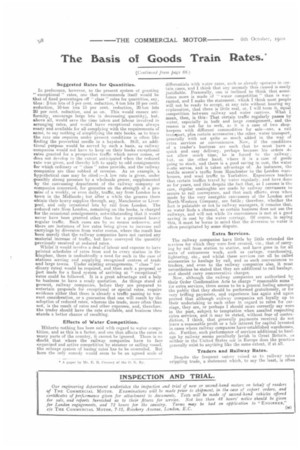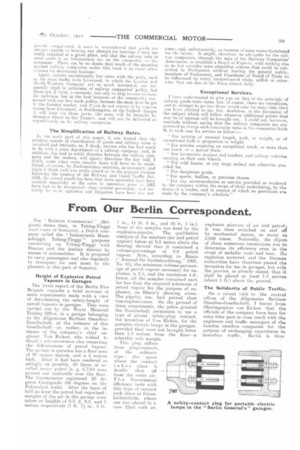The Basis of Goods Train Rates.
Page 12

Page 13

If you've noticed an error in this article please click here to report it so we can fix it.
Suggested Rates for Quantities.
In preference, however, to the present system of granting "exceptional " rates, one that recommends itself would be that of fixed percentages off " class " rates for quantities, say, thus: 2-ton lots of 5 per cent. reduction) 4-ton lots 10 per cent.
reduction, 10-ton lots 15 per cent. reduction, 20-ton lots 20 per cent, reduction, and so on. This would ensure uni formity, encourage large lots fa decreasing quantity), but, above all, would save the time taken and labour involved in arranging rates, and would leave exceptional rates always ready and available for all complying with the requirements of same, to say nothing of simplifying the rate books, as to trace the rate one requires under present conditions is often like finding the proverbial needle in a haystack. Still, an addi tional purpose would be served by such a basis, as railway .companies would not have to keep on their books exceptional
rates granted for a prospective traffic which never comes, or
does not develop to the extent anticipated when the reduced rate was given, and thereby left to apply to odd consignments
for which ordinary or " class " rates provide, and the railway
companies are thus robbed of revenue. As an example, a hypothetical case may be cited :—A low rate is given, under possibly strong pressure by a wholesale grocer, supplemented by the canvassing department of the railway company or companies concerned, for groceries on the strength of a pro mise of a weekly, or even daily, traffic, say from London to a town in the Midlands; but after a while the grocers there obtain their heavy supplies through, say, Manchester or Liver pool, and only occasional lots by rail from London. The
reduced rate from London, remaining on the books, is charged for the occasional consignments, notwithstanding that it would
never have been granted other than for a promised heavy
regular traffic. Such cases are by no means uliknowii, and there are instances of low rates being given to increase rail carryings by diversion from water routes, where the result has been merely that the railway companies have not carried any -material increase of traffic, but have conveyed the quantity previously received at reduced rates. Whilst it would involve a deal of labour and expense to have printed schedules of rates from and to every station in the Itingdom, there is undoubtedly a need for such in the ease of
stations serving and supplying recognized centres of trade and large towns. Under existing arrangements, " class " (ordinary rates) would be required, and then such a proposal as just made for a fixed system of arriving at " exceptional " rates could be followed. It is a great advantage and a help
to business to have a ready quotation. As things stand at present, railway companies, before they are prepared to
entertain proposals for exceptional or special rates, require evidence either that there is already a traffic passing to warrant consideration, or a guarantee t'hat one will result by the adoption of reduced rates, whereas the trade, more often than not, is the result of rates and other expenses, and, therefore, the trader should have the rate available, and business then stands a better chance of resulting.
Effects of Water Competition.
Hitherto nothing has been said with regard to water competition, and as this is a factor, and one that affects the rates in many parts of the country, it cannot be ignored. There is no doubt that where the railway companies have to face organized and active competition by steamer or sailing vessel, the mileage system of basing rates has to. be overruled. But here the only remedy would seem to be an agreed scale of
differentials with water rates, such as already operates in certain cases, and I think that any anomaly thus caused is easily justifiable. Personally, one is inclined. to think that sometimes more is made of " water competition " than is warranted, and I make the statement, which I think most people will not be ready to accept, at any rate without hearing my explanation, that there is little real, or, I will term it, equal competition between railway and water carriers. What I mean, then, is this : That certain traffic regularly passes by water, especially in bulk arid large consignment, and the reason is not far to seek, as it is a case of two shopkeepers with different commodities for sale—one, a rail transport, plus certain accessories; the other. water transport, generally with not quite so much added in the way of extra services or conveniences. Now, if the conditions of ii, trader's business are such that he must have a quick and. easy delivery, perhaps because his orders do not allow much time, he is forced to the railway ; but, on the other hand, where it is a case of goods going to stock, and there is a good saving in cost, the water mute serves, and is taken advantage of. As instances, the textile season's traffic from Manchester to the London warehouses, and wool traffic to Yorkshire. Experience teaches that certain traffics travel by water regularly, and have done so for years, and this despite the fact that. as 1 assume is the case, regular onslaughts are made by railway canvassers to secure to rail conveyance, and that such efforts, even when made by the very energetic canvassers of the London and North-Western Company, are futile; therefore, whether the fact is palatable or not to railway managers, it remains that, as water finds a channel, so certain business does not use the railways, and will not while its convenience is met at a good saving in cost by the water carriage. Of course, in saying this, it must be borne in mind that the diversion to water is often precipitated by some dispute.
Extra Services.
The railway companies have little by little extended the rvices for which they were first created, viz., that of carrying by rail from station to station, and have gone in for all sorts of extraneous work, such as cartage, warehousing, lightering, etc., and whilst, these services can all be called accessories to haulage by rail, and as such conveniences to traders, and even to the railway companies also, it must nevertheless be stated that they are additional to rail haulage, and should carry remunerative charges.
Now, although the railway companies are authorized by their Order Confirmation Acts to charge "reasonable sums" for extra services, there seems to be a general feeling amongst the public that they should be performed gratuitously, or for very trifling payments, and experience has agaia and again proved that although railway companies act loyally up to their undertaking to each other in regard to rates for carriage, they are, or perhaps I should more correctly say were in the past, subject to temptation when assailed respecting extra services, and it may be stated, without fear of contradiction, I think, that generally payments received do not leave a reasonable profit or a fair interest for capital invested in cases where railway companies have-established warehouses, etc. Further; such performance of services additional to haulage by railway seems peculiarly lavish in Great Britain. as neither in the United States nor in Europe does the practice generally exist to anything like the same extent, if at all.
Traders and Railway Rates.
Despite the frequent outcry raised as to railway rates crippling trade, a statement which, to say the least, is often exag.,eiatial. it. most be remembered dial go.als are always capable of bearing any charges for carriage if they are really required at a given place, and that the railway rate in most cases is an infinitesimal tax on the commodity to the consumer. There can be no doubt that much of the shouting aeainst. railway companies under this head is to cover other reasmie for decreasing business.
Again, certain exceptionally low rates with the ports, such asi for meat traffic from Liverpool, in which the Leiden and North-Western Company are so much interested, are frequently cited in criticisms of railway companies' policy, but these are, I claim, a necessity, not ody to help to earn revenue for railways, but in the best interests of the community consonant with our free trade policy, because the meat is to be got te the London market, and if you do not convey it. by express tiains from Liverpool, or Southampton, at the highest. charges it will bear via those ports, the same will be broueht by steamers direct to the Thames, and will not. be delivered so expeditiously as by railway companies.
The Simplification of Railway Rates.
In the eerly part of this paper, it was hinted that the existing system of classification of goods and railway rates is involved and intricate, as, I think, anyone who has had much to do with a rates department of a railway company, and, in addition, has had to settle disputes between the railway company and the traders, will agree; therefore the day will. I think, come when some simpler basis will have to be established, of course, by Parliamentary sanction, as necessary, and while I think such was really aimed at in the general revision followine the passing of the Railway and Canal Traffic Act, 1888, the actual result has been that more anomalies have been created— especially as the rates in operation prior to 1893 have had to be recognized—than existed previiinely, aod cer. tainly far mare agitation and litigation have been the out
come ; and, unfortunately, an increase of same seems threatened for the future. It might, therefore, be advisable for the railway companies, through the tegis of the Railway Companies' Association, to establish a Beard of Faiperts, with nothing else to do but consider some simplified scheme that could be submitted to Parliament without leaving the general public, members of Parliament, and Presidents of Board of Trade to be influenced by every inexperienced whim, selfish or otherwise, that one sees in the Press almost daily.
Exceptional Services.
T have endeavoured to give you an idea of the principle of railway goods train rates, but, of course, there are exceptions, and to attempt to go into thsee would take far more time than you have allotted to me, but, doubtless, in the discussion of the subject which will follow whatever additional points that may be of interest will be brought out. I could not, however, conclude without saying that the railway companies are empowered to charge such seasonable sums as the companies think fit in each case for service as follow:—
" For articles of unusual length, hulk, or weight, or of exceptional hulk in proportion to weight.
" For articles requiring an exceptional truck, or more than one truck, or a special train.
" For locomotive engines and tenders, and railway vehicles running on their own wheels.
" For wild beasts, or any large animal not otherwise provided for.
" For dangerous goods.
" For specie, bullion, or precious stones.
" For any accommodation or service provided or rendered by the company within the scope of their undertaking, by tha desire of a trader, and in respect of which no provisions arcs made by the company's schedule."




















